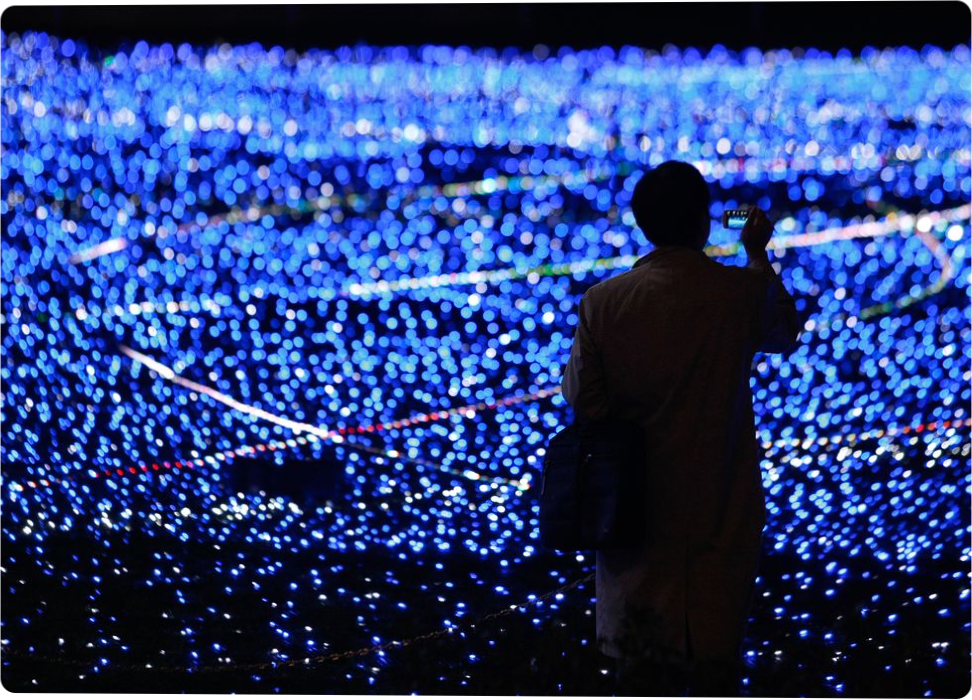 This Christmas, Japan is aglow with big news. Big BLUE news. Three brilliant Japanese physicists, Hiroshi Amano, Isamu Akasaki and Shuji Nakamura, have been awarded a Nobel prize for their creation of the blue light-emitting diode (LED), a key to energy-efficient white light. Twinkling blue light displays throughout Tokyo commemorate the occasion. The faces of the three are splashed across media outlets. Interviews and guest appearances abound. The emperor confers a national award in a special ceremony at the Imperial Palace. Everyone who is anyone attends the galas. The people of Japan are celebrating the gift of light! The Nobel Prize committee declared, "This LED holds great promise...to increase the quality of life for billions of people."
This Christmas, Japan is aglow with big news. Big BLUE news. Three brilliant Japanese physicists, Hiroshi Amano, Isamu Akasaki and Shuji Nakamura, have been awarded a Nobel prize for their creation of the blue light-emitting diode (LED), a key to energy-efficient white light. Twinkling blue light displays throughout Tokyo commemorate the occasion. The faces of the three are splashed across media outlets. Interviews and guest appearances abound. The emperor confers a national award in a special ceremony at the Imperial Palace. Everyone who is anyone attends the galas. The people of Japan are celebrating the gift of light! The Nobel Prize committee declared, "This LED holds great promise...to increase the quality of life for billions of people."The blue light has come? Big deal. The TRUE LIGHT has already come! It's Christ that truly "holds great promise to increase the quality of life for billions of people." Yet the arrival of our Savior was met with so little fanfare. No national awards. No invitation to the palace. No photo opps. No fan letters. No glitzy festivities. The only special invited guests were a stable of animals and some outcast shepherds.
And so it is up to us today, the people of the cross, to CELEBRATE the gift of Light. Just think! The Light of the World has dawned...for you! The illumining work of his Spirit flooded your darkened mind. God rescued you from the kingdom of darkness and made you a citizen of the kingdom of light. Your gloomy tomorrows were swept away by brilliant hope. There's no more need for groping along the dark alleys of life; now divine guidance lights your way. And the ominous shadow of death has been driven off by glorious resurrection hope. The dawn of TRUE LIGHT in our world and your life is cause for great celebration. So enjoy your Christmas!
And while celebrating, remember it's also up to us to SHARE this gift of Light. Nations and peoples are still "walking in darkness" (Isa 9:2). In Japan it adds up to more than 99% of the population.
There's a tinge of irony in Japan becoming a Nobel laureate for illumination. One also wonders why, in this spiritually dark country, the people are increasingly enraptured by massive seasonal light displays. Can it be that the Japanese are searching and fumbling through the darkness for a TRUE LIGHT that the Spirit whispers to them about? Already in the dark corners of Kawasaki, Japan, that True Light has dawned. In 2014, darkness fell just a little bit more in our corner of the world as people responded by faith in Christ to God's call on their heart. Together with you, we push back the darkness inch by inch. We proclaim the "Light of the World" with all the strength and capacity God gives. We claim the promise of Isaiah 51:4 that "nations will come to your light, and kings to the brightness of your dawn."
Blue LEDs? They might change something somewhere perhaps. But the TRUE LIGHT of the world? He'll change everything for sure! Let's celebrate Him. Let's share him. Merry Christmas!










